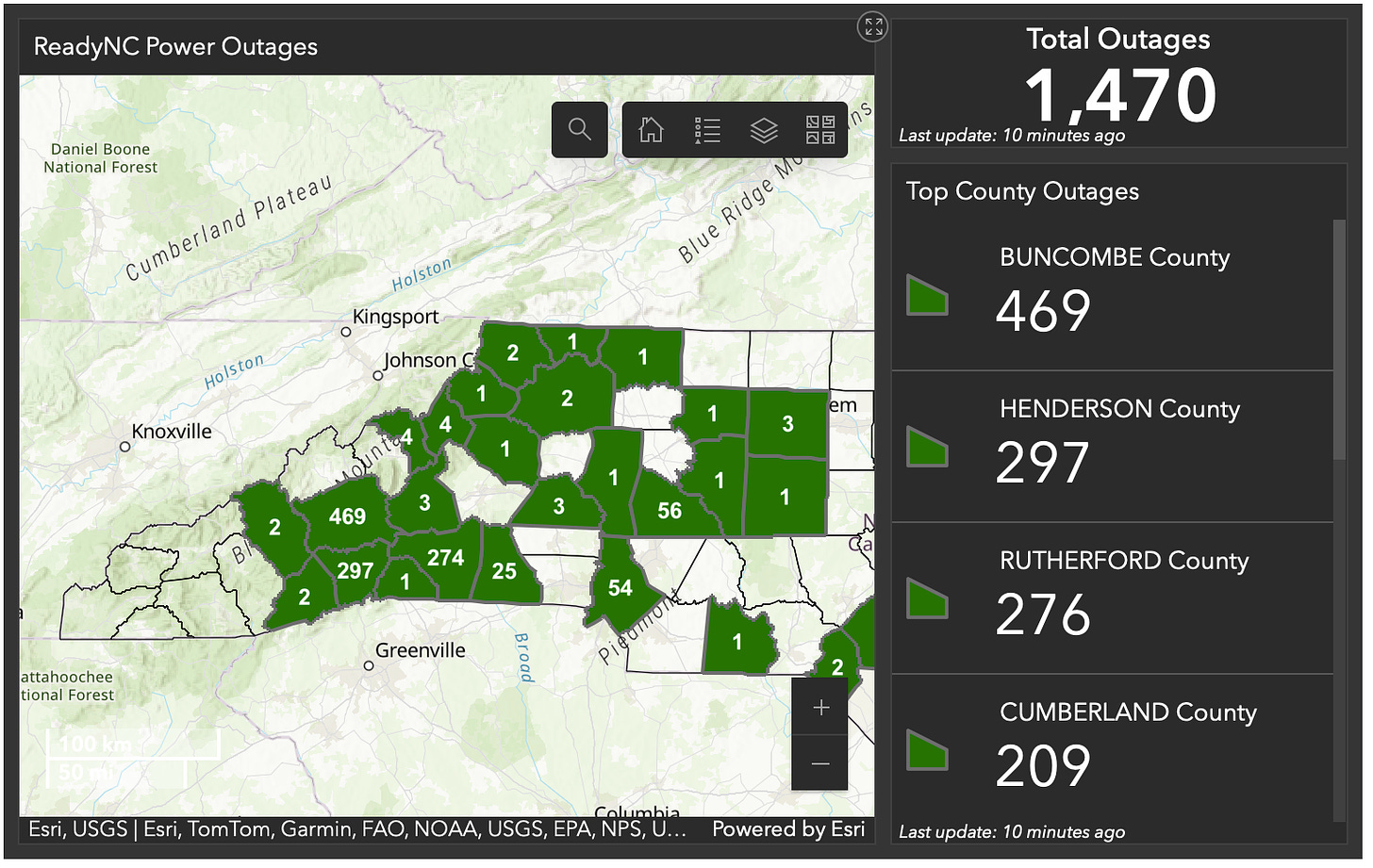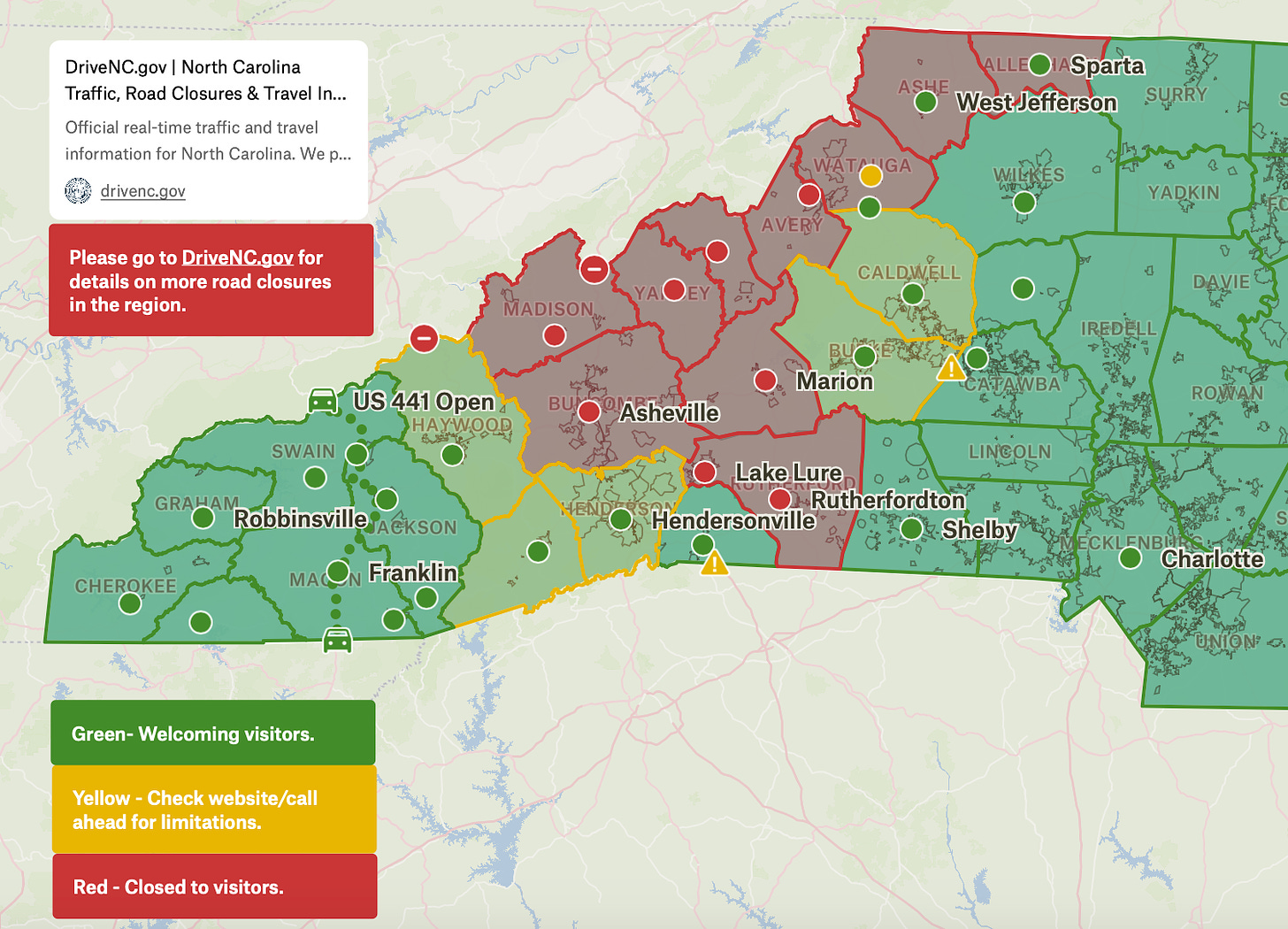Water troubles are likely to persist
Plus: Creative options examined for rebuilding I-40; More bug stings and bites; Early voting described as strong; Dramatic escape in Swannanoa; Tourism welcomed in some spots
You’re reading Mountain Updates, a free pop-up newsletter from The Charlotte Ledger examining the crisis and recovery in the N.C. mountains. Ledger subscribers can add Mountain Updates on their “My Account” page.
Sign up for free:
It has been three weeks since the storm hit Western North Carolina.
In many areas, officials and residents have made plenty of progress. Power has been mostly restored. Asheville has water running in most of its system, though it’s not safe to drink yet. People who lost their homes are settling elsewhere. Cell service is mostly back online — or at least as much as it usually is in the mountains.
But some areas will take a long, long time to come back.
North Carolina Health News looked this week at the many challenges in Mitchell County, north of Asheville along the border Tennessee state line. It contains two towns, Bakersville and Spruce Pine.
The area’s state senator, Ralph Hise, shared some of the troubles:
“There [are] still areas you can’t access unless you’re on a motorcycle.”
“Mitchell County Water Treatment System for the entire county, both towns, is gone. It does not exist, and it’s unsalvageable. That’s a four-year process to put a water treatment plant back in. We don’t have a temporary solution to these things right now.”
The sewer plant was destroyed — under 15 feet of water at the height of the storm. “The tanks don’t hold water anymore. All of the electronics are gone. Two of the buildings are gone. … I mean, it’s intentionally built on the river.”
He said officials crunched the numbers for taking sewage to Asheville’s system, but that would require “60 trucks running 24 hours a day.”
It sounds as though some of what we consider basic necessities — running water, flushing toilets — might be a challenge in Mitchell County for months or years to come. —Tony Mecia
Some of the latest news coming out of the N.C. mountains:
Creative options explored in rebuilding I-40: The N.C. Department of Transportation plans to use a novel approach to replace the section of I-40 near the Tennessee border that was damaged by the hurricane and remains closed. It will ask design firms and contractors for ideas, which could include elevating the road on a viaduct (like the Blue Ridge Parkway), moving the river or finding a new route for the highway altogether. “We are looking at all options,” an NCDOT official said. Transportation Secretary Pete Buttigieg visited the region Thursday. (The Mountaineer)
Higher unemployment benefits: Gov. Roy Cooper signed an executive order increasing weekly unemployment benefits from $350 to $600 for workers affected by Hurricane Helene. The increase applies statewide due to federal law, but the majority of the benefits will go to workers in the counties experiencing the worst damage. (WRAL)
Progress on restoring water: About 80% of Asheville’s water customers now have running water, though it is non-potable because of sediment in the city’s main reservoir. (Asheville Watchdog)
Uptick in stinging and biting insects: State officials say they are receiving “anecdotal reports of increased numbers of stinging insects” in the areas of Western North Carolina most affected by the storm, including incidents involving bees, yellow jackets and fire ants. The increased amount of debris and potential losses of the insects’ hives or nests could be leading to more encounters, a UNC Charlotte biologist said. (Observer)
Voting numbers strong, even in mountains: Thousands of mountain residents cast votes on Thursday on the first day of early voting in North Carolina, in numbers characterized as stronger than usual. The executive director of the State Board of Elections said: “Yesterday’s turnout is a clear sign that voters are energized about this election, that they trust the elections process, and that a hurricane will not stop North Carolinians from exercising their right to vote.” There was a “steady crowd” in Henderson County, and nearly 6,500 residents cast votes in Buncombe County on Thursday.
With his dog, Coco, he escaped through his roof and was rescued by a kayaker
The Asheville Citizen Times shares the dramatic story of a man in the Buncombe County town of Swannanoa who barely escaped the rising flood, as roads out of his neighborhood were impassible because of the water.
Around 5 a.m. on Sept. 27, the paper reported, water reached David Donald’s garage. He was on the phone with his wife, Kate, who was on a work trip to Florida, as the waters kept rising. The story continues:
David began preparing to leave, but then, he received more bad news: The road out of his neighborhood was flooded. …
The water began flowing into the house.
“Once the water started going to (the) house, it just seemed like a matter of minutes, me and my dog were on the bed,” he said. “Water just started coming up and things started dropping in the house. Things started to float like, you know, I even heard the refrigerator fall down. So I’m going in there, and … I’m trying to put myself at a higher level. And it started getting to my waist.”
He called 911 and began trying to get into his attic, but the hole into the attic was relatively small.
“It’s not one of those pull-down attics. It’s one that you have to have a ladder,” David Donald said. “I'm standing on a laundry basket, and so I’m trying to pull myself up, … and as the water’s going up and up, and … I’m just like, crawling and trying to get up there.”
His dog, Coco, a pomeranian-chihuahua mix, got back in the water, “and I had to get her and put her back in there. And then finally, I got up in there,” he said.
But once in the attic, the water kept rising. He looked out of a vent and waved for help to a kayaker, the Citizen Times reported. A neighbor then came to punch a hole in the roof with an ax, and Donald and Coco climbed out. They shivered on the roof for more than two hours before being rescued by someone else in a kayak.
They lost all their belongings except for a computer, which was stored in a waterproof case. They have since relocated to a new house, nowhere near a river. Donald has already checked the access to the attic, his wife said.
➡️ You can read the full story from the Asheville Citizen Times here.
Power restoration is almost there
Power utilities aren’t quite finished yet, but they are continuing to make substantial progress on restoring power.
The latest state data as of this afternoon shows about 1,500 customers statewide without power. Buncombe County, home to Asheville and Black Mountain, has the most, with 469, followed by Henderson County (297) and Rutherford County (276).
Two days ago, the figure was about 9,600.
Duke Energy seems to have the bulk of the customers, but there are also regional energy cooperatives.
In main Charlotte Ledger: Some mountain counties are welcoming tourists
In today’s main Charlotte Ledger, we looked at the topic of tourism — and how some mountain counties that largely dodged the damage from the storm are now pleading for tourists.
Counties west of Asheville say visitors are largely staying away, assuming that the entire N.C. mountains are inaccessible or busy recovering from damage. Not so, say tourism officials and hoteliers in those counties.
The state also has a map of which areas are open to tourism and which areas should be avoided:
➡️ You can read the full article here (available to Ledger members).
How to help
Many organizations have deployed groups across the region, tasked with distributing food, water and supplies. You can donate to their efforts at the links below.
Hearts with Hands, a local disaster relief organization, has a donation page to provide food, supplies and water.
United Way of North Carolina has established a fund to help residents affected by the flooding.
MANNA Foodbank, which serves 16 counties in Western North Carolina, is accepting food, supplies and monetary donations. The organization’s warehouse on Swannanoa River Road in Asheville was damaged by the hurricane.
The American Red Cross is accepting donations to help residents in the Southeast.
Samaritan’s Purse, which is headquartered in Boone, is scheduling volunteers to help with debris cleanup.
Operation Blessing has a donation page to provide food, supplies and water.
E4E Relief, a Charlotte-headquartered provider of emergency financial relief programs on behalf of corporations, is accepting donations for their newly established Hurricane Helene Community Fund, offering financial support to individuals with long-term impacts from Hurricane Helene.
Need to sign up for this e-newsletter? We offer a free version, as well as paid memberships for full access to all of our local newsletters:
➡️ Opt in or out of different newsletters on your “My Account” page.
➡️ Learn more about The Charlotte Ledger
The Charlotte Ledger is a locally owned media company that delivers smart and essential news through e-newsletters and on a website. We strive for fairness and accuracy and will correct all known errors. The content reflects the independent editorial judgment of The Charlotte Ledger. Any advertising, paid marketing, or sponsored content will be clearly labeled.
Like what we are doing? Feel free to forward this along and to tell a friend.
Social media: On Facebook, Instagram, Twitter and LinkedIn.
Sponsorship information/customer service: email support@cltledger.com.
Executive editor: Tony Mecia; Managing editor: Cristina Bolling; Staff writer: Lindsey Banks; Business manager: Brie Chrisman





